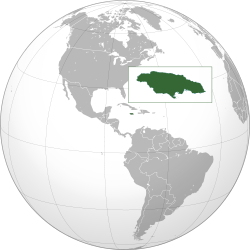
Back بوابة:جامايكا Arabic প্রবেশদ্বার:জ্যামাইকা Bengali/Bangla Portal:Jamaica Spanish Portail:Jamaïque French Puotal:Jumieka JAM Portal:Jamaica Portuguese باب:جمیکا Urdu
The Jamaica Portal
Jamaica is an island country in the Caribbean Sea and the West Indies. At 10,990 square kilometres (4,240 sq mi), it is the third-largest island—after Cuba and Hispaniola—of the Greater Antilles and the Caribbean. Jamaica lies about 145 km (78 nmi) south of Cuba, 191 km (103 nmi) west of Hispaniola (the island containing Haiti and the Dominican Republic), and 215 km (116 nmi) southeast of the Cayman Islands (a British Overseas Territory). With 2.8 million people,0 Jamaica is the third most populous Anglophone country in the Americas (after the United States and Canada), and the fourth most populous country in the Caribbean. Kingston is the country's capital and largest city. Most Jamaicans are of Sub-Saharan African ancestry, with significant European, East Asian (primarily Chinese), Indian, Lebanese, and mixed-race minorities. Because of a high rate of emigration for work since the 1960s, there is a large Jamaican diaspora, particularly in Canada, the United Kingdom, and the United States. The country has a global influence that belies its small size; it was the birthplace of the Rastafari religion and reggae music (and such associated genres as dub, ska, and dancehall); and it is internationally prominent in sports, including cricket, sprinting, and athletics. Jamaica has sometimes been considered the world's least populous cultural superpower. (Full article...) Selected article -Kingston Harbour in Jamaica is the seventh-largest natural harbour in the world. It is an almost landlocked area of water approximately 16 kilometres (9.9 mi) long by 3.2 kilometres (2.0 mi) wide. Most of it is deep enough to accommodate large ships, even close to shore. It is bordered to the north by the city of Kingston, the capital of Jamaica; to the west by Hunts Bay and the municipality of Portmore; and to the south and east by the Palisadoes strip, which protects it. The harbour is home to the Kingston Container Terminal, Jamaica's largest port. Other docks on Kingston Harbour are at the Petroleum Corporation of Jamaica in downtown Kingston and at the Jamaica Flour Mills and the Caribbean Cement Company at Rockfort. Fresh water, along with industrial and domestic waste, is discharged into Hunts Bay from rivers and drainage gullies, including Rio Cobre and Sandy Gully. (Full article...) Did you know (auto-generated)
Selected biography -Cecil Bustamente Campbell OD (24 May 1938 – 8 September 2016), known professionally as Prince Buster, was a Jamaican singer-songwriter and producer. The records he released in the 1960s influenced and shaped the course of Jamaican contemporary music and created a legacy of work that would be drawn upon later by reggae and ska artists. (Full article...) General images -The following are images from various Jamaica-related articles on Wikipedia.
This is a Good article, an article that meets a core set of high editorial standards.
Robert Nesta Marley OM (6 February 1945 – 11 May 1981) was a Jamaican singer, songwriter, and guitarist. Considered one of the pioneers of reggae, he fused elements of reggae, ska and rocksteady and was renowned for his distinctive vocal and songwriting style. Marley increased the visibility of Jamaican music worldwide and became a global figure in popular culture. He became known as a Rastafarian icon, and he infused his music with a sense of spirituality. Marley is also considered a global symbol of Jamaican music and culture and identity and was controversial in his outspoken support for democratic social reforms. Marley also supported the legalisation of cannabis and advocated for Pan-Africanism. Born in Nine Mile, Jamaica, Marley began his career in 1963, after forming the group Teenagers with Peter Tosh and Bunny Wailer, which became the Wailers. In 1965, they released their debut studio album, The Wailing Wailers, which included the single "One Love", a reworking of "People Get Ready". It was popular worldwide and established the group as a rising figure in reggae. The Wailers released 11 more studio albums, and after signing to Island Records, changed their name to Bob Marley and the Wailers. While initially employing louder instrumentation and singing, they began engaging in rhythmic-based song construction in the late 1960s and early 1970s, which coincided with Marley's conversion to Rastafari. Around this time, Marley relocated to London, and the group embodied their musical shift with the release of the album The Best of The Wailers (1971). (Full article...) Selected picture - Jamaican singer Jimmy Cliff performing in 2012
Selected cuisines, dishes and foods - Jamaican cuisine includes a mixture of cooking techniques, flavours and spices influenced by Amerindian, West African, Irish, English, French, Portuguese, Spanish, Indian, Chinese and Middle Eastern people who have inhabited the island. It is also influenced by indigenous crops, as well as, crops and livestock introduced to the island from Mesoamerica, Europe, tropical West Africa and Southeast Asia— which are now grown locally. A wide variety of seafood, tropical fruits and meats are available. Some Jamaican dishes are variations of cuisines brought to the island from elsewhere, which are often modified to incorporate local produce and spices. Many others are novel or Creole dishes, created from a fusion of dishes, techniques and ingredients from different cultures— which have developed locally over time. Popular Jamaican dishes include curry goat, fried dumplings, brown stew oxtail, ackee and saltfish and jerk. Jamaican patties along with various pastries, breads and beverages are also popular. (Full article...)
More did you know
Selected listsTopicsCategoriesRelated portals
WikiProjectsGeographical:
History and Society:
Tasks
Associated WikimediaThe following Wikimedia Foundation sister projects provide more on this subject:
More portals
| ||||||||||||





















































